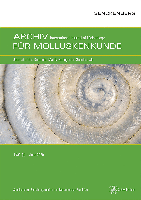
ARCHIV FUR MOLLUSKENKUNDE
Scope & Guideline
Unveiling the Wonders of Mollusk Diversity
Introduction
Aims and Scopes
- Taxonomic Research:
The journal publishes detailed taxonomic revisions and descriptions of new species across various molluscan groups, emphasizing the importance of accurate classification and nomenclature. - Phylogenetics and Evolution:
Research on the phylogenetic relationships among molluscan species is a core focus, providing insights into evolutionary patterns and biogeographic distributions. - Ecological and Biogeographic Studies:
Publications often include studies on the ecology and distribution of mollusks, highlighting their roles in ecosystems and responses to environmental changes. - Morphological and Anatomical Studies:
The journal features research on the morphology and anatomy of mollusks, contributing to a deeper understanding of their functional biology and evolutionary adaptations. - Molecular Techniques in Malacology:
Papers employing molecular methods for species identification and phylogenetic analysis are common, reflecting a modern approach to malacological research.
Trending and Emerging
- Invasive Species Research:
There is an increasing trend in studies focusing on invasive molluscan species, examining their impacts on native ecosystems and the implications for biodiversity. - Molecular Phylogenetics:
Research utilizing molecular techniques to resolve phylogenetic relationships is gaining traction, reflecting advances in genetic analysis and its application in taxonomy. - Climate Change Impacts:
Emerging papers are beginning to address the impact of climate change on molluscan populations, indicating a growing awareness of this critical issue within malacology. - Micro-mollusks and New Taxa:
There is a notable increase in the discovery and description of micro-mollusks and new taxa, showcasing the richness of biodiversity and the need for detailed studies in underexplored areas. - Conservation and Ecological Studies:
Research focusing on the conservation status and ecological roles of mollusks is becoming more prominent, aligning with global conservation efforts and environmental awareness.
Declining or Waning
- Marine Mollusks Research:
There has been a noticeable decrease in the number of studies focusing on marine mollusks, especially in comparison to the growing focus on terrestrial species. This shift may reflect broader trends in research funding and interest. - Historical and Paleontological Studies:
The volume of papers dedicated to historical or paleontological aspects of mollusks has diminished, indicating a waning interest in these topics compared to contemporary ecological and molecular studies. - General Malacological Surveys:
Broad surveys of molluscan diversity in specific regions are becoming less frequent, possibly as researchers focus on more targeted taxonomic or ecological studies.
Similar Journals
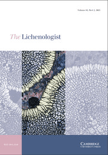
LICHENOLOGIST
Illuminating the Hidden Life of LichensLICHENOLOGIST is a prestigious journal published by Cambridge University Press, dedicated to advancing the field of lichenology and promoting a deeper understanding of the ecology, evolution, and systematics of lichens. Established in 1958 and focusing on the convergence of research through 2024, this journal has established itself as a significant resource within the Q2 category of Ecology, Evolution, Behavior and Systematics. With a Scopus ranking of #316 out of 721 in its field, it highlights research that not only enhances academic knowledge but also has practical implications for ecology and conservation efforts globally. Although traditionally not an open-access journal, it provides valuable insights and contributes to the scientific community by disseminating high-quality, peer-reviewed research. LICHENOLOGIST is essential for researchers, professionals, and students looking to stay informed about the latest advancements in lichen studies, making it an indispensable resource for anyone involved in ecological and biological sciences.
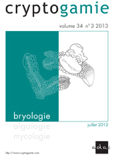
CRYPTOGAMIE BRYOLOGIE
Advancing Knowledge in the World of MossesCRYPTOGAMIE BRYOLOGIE is a prominent academic journal published by ADAC-CRYPTOGAMIE, focusing on the intricate field of bryology—the study of mosses and other bryophytes. Established in 1999 and continuing its commitment to scholarly excellence through to 2024, this journal serves as a vital platform for researchers, professionals, and students invested in ecosystem dynamics, plant sciences, and evolutionary biology. Recognized for its rigorous peer-review process and notable contributions, CRYPTOGAMIE BRYOLOGIE holds esteemed rankings, with a Q3 categorization in Ecology, Evolution, Behavior and Systematics and Q2 in Plant Science as of 2023. While the journal operates without open access, its articles are essential for advancing knowledge and fostering discussion in the disciplines it serves. Given its strategic position within the Scopus Ranks, where it occupies significant rankings in the domains of Plant Science and Ecology, the journal is poised to influence ongoing research and inspire future studies in the rapidly evolving world of bryophytes.

BRITTONIA
Exploring the Richness of Botany and EcologyBRITTONIA, published by Springer, stands as a reputable journal dedicated to advancing the fields of botany and plant sciences. With a storied history dating back to 1931, this journal has evolved to embrace contemporary research spanning various aspects of plant biology, ecology, and systematics. Focusing on a comprehensive analysis of both ecological interactions and plant systematics, BRITTONIA plays a crucial role in disseminating knowledge among researchers and professionals committed to understanding plant life and its environmental contexts. Despite its open access status being currently unavailable, the journal ensures wide accessibility through institutional subscriptions. In the latest rankings, it proudly holds a Q2 category in Plant Science and a Q3 category in Ecology, Evolution, Behavior, and Systematics, indicating its growing influence and academic rigor. Researchers and students alike will find BRITTONIA an essential resource for the latest findings and discussions in plant sciences.

PLANT SYSTEMATICS AND EVOLUTION
Connecting Taxonomy and Ecology for a Greener TomorrowPlant Systematics and Evolution is a prestigious journal published by Springer Wien, dedicated to advancing research within the fields of plant taxonomy, evolution, and ecology. With its ISSN 0378-2697 and E-ISSN 1615-6110, this journal has been pivotal in shaping the scientific landscape since its inception in 1974. Based in Austria, it occupies a significant position in the academic community, being ranked in the Q2 quartile in both Ecology, Evolution, Behavior and Systematics and Plant Science as of 2023. This high-impact journal is recognized for its rigorous peer-review process and is indexed among the top publications in its category, holding a Scopus rank of #176 out of 516 in Plant Science and #252 out of 721 in Ecology, highlighting its relevance and quality in the research community. Although it does not currently offer open access, the journal is committed to making significant contributions to the understanding of plant biodiversity and evolutionary processes. This makes it an essential resource for researchers, professionals, and students aiming to know the latest developments in the study of plant systematics and evolution.

RAFFLES BULLETIN OF ZOOLOGY
Pioneering Research for Global Wildlife ManagementRaffles Bulletin of Zoology, published by the National University of Singapore's Lee Kong Chian Natural History Museum, serves as a prestigious platform for the dissemination of cutting-edge research in Animal Science and Zoology, as well as Ecology, Evolution, Behavior and Systematics. With a current impact factor reflective of its Q2 category in both fields, this journal not only enhances its visibility in the academic community but also provides valuable insights into the complexities of biodiversity and conservation efforts. Covering a wide array of topics, Raffles Bulletin facilitates interdisciplinary collaboration and serves as an essential resource for researchers, professionals, and students alike. It is indexed in Scopus, ranking #233 out of 490 in Animal Science and Zoology and #406 out of 721 in Ecology, ensuring that the research published contributes significantly to the global discourse on wildlife and ecosystem management. Since its inception in 1996, this journal has bridged gaps in knowledge and continues to foster a deeper understanding of the living world.
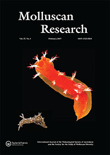
MOLLUSCAN RESEARCH
Exploring the Depths of Molluscan DiversityMolluscan Research is a distinguished journal dedicated to advancing the field of molluscan science, covering a broad spectrum of topics including taxonomy, ecology, evolutionary biology, and conservation. Published by Taylor & Francis Ltd, this journal has been a crucial resource for researchers from its inception in 1987 up to 2024, significantly contributing to the understanding of molluscan species and their roles in various ecosystems. With an impressive impact factor and recognized within the Q3 quartile rankings in Animal Science and Zoology and Ecology, Evolution, Behavior and Systematics, as well as Q4 in Genetics, Molluscan Research serves as a vital platform for dissemination of high-quality original research and reviews. While it does not currently offer Open Access options, the journal remains accessible through institutional subscriptions, fostering collaboration and knowledge-sharing among researchers, professionals, and students across the globe.

European Journal of Taxonomy
Fostering collaboration in the study of biodiversity.The European Journal of Taxonomy is a distinguished open access journal, published by the MUSEUM NATL HISTOIRE NATURELLE in France, dedicated to the rich and dynamic field of taxonomy, ecology, and systematics. Since its inception in 2011, this journal has aimed to provide a platform for the dissemination of high-quality research and innovative methods relevant to the study of biodiversity and species classification. With a commendable Q2 ranking in the Ecology, Evolution, Behavior and Systematics category as of 2023, the journal ranks 380 out of 721 in Scopus, highlighting its pivotal role in advancing scientific knowledge in these essential areas. Researchers and students alike will find valuable resources and contributions that address pressing ecological and evolutionary questions from 2015 to 2024. By promoting open access, the European Journal of Taxonomy ensures that vital research is accessible to a broader audience, fostering collaboration and discourse among professionals striving to enhance our understanding of the natural world.
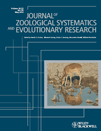
JOURNAL OF ZOOLOGICAL SYSTEMATICS AND EVOLUTIONARY RESEARCH
Pioneering Discoveries in Zoology and EcologyThe Journal of Zoological Systematics and Evolutionary Research, published by Wiley-Hindawi, stands as a premier academic journal since its establishment, showcasing cutting-edge research in the fields of Animal Science, Zoology, and Ecology. With an impressive track record spanning from 1963 to the present, this journal has earned a Q1 classification in both Animal Science and Ecology, as well as recognized rankings in Genetics and Molecular Biology. Its impact is highlighted by its Scopus ranks, placing it in the top percentile for relevant categories, underscoring its vital role in advancing knowledge and understanding within these disciplines. Researchers, professionals, and students will find a wealth of high-quality, peer-reviewed articles that contribute to the evolutionary understanding of biodiversity and systematics. Though not an Open Access journal, it remains accessible to a wide audience committed to exploring the intricacies of zoology and evolutionary biology.

JOURNAL OF CONCHOLOGY
Connecting Researchers Through Mollusk StudiesJOURNAL OF CONCHOLOGY, published by the Conchological Society of Great Britain & Ireland, is a prominent academic journal focused on the study of mollusks, specifically their taxonomy, ecology, and evolutionary biology. Through its rigorous peer-review process, it aims to provide a platform for significant research in the field, fostering deeper understanding and appreciation of these diverse organisms. Although it is not currently an Open Access journal, its publications contribute notably to the fields of Agricultural and Biological Sciences, notably in Ecology, Evolution, Behavior and Systematics and Aquatic Science, as indicated by its rankings in Scopus. The journal's archives trace comprehensive coverage from 1981 to 1990 and from 1996 to 2018. With its commitment to advancing conchological knowledge, the JOURNAL OF CONCHOLOGY serves as a crucial resource for researchers, professionals, and students invested in the biological and ecological dimensions of mollusk studies.
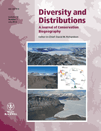
DIVERSITY AND DISTRIBUTIONS
Advancing ecological understanding through diversity.DIVERSITY AND DISTRIBUTIONS is a leading journal in the field of ecology, evolution, and systematics, published by WILEY. With an impressive impact factor and designated as Q1 in its category for 2023, this journal ranks 49th out of 721 in the Scopus database, placing it in the top 93rd percentile among its peers. The journal has been committed to advancing knowledge since its inception in 1998 and has embraced Open Access since 2019, ensuring that research is accessible to a broad audience globally. By publishing high-quality, peer-reviewed articles that explore biodiversity patterns, conservation strategies, and ecological dynamics, DIVERSITY AND DISTRIBUTIONS plays a crucial role in fostering discussions that help to understand and mitigate global ecological challenges. Located in the United Kingdom, this journal serves a diverse community of researchers, professionals, and students, making significant contributions to science and policy regarding biodiversity and its distributions.